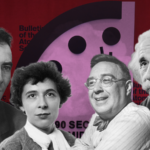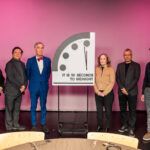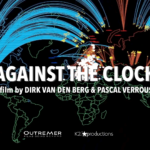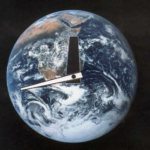Press Release—Welcome to “The New Abnormal”
By Bulletin Staff | January 24, 2019
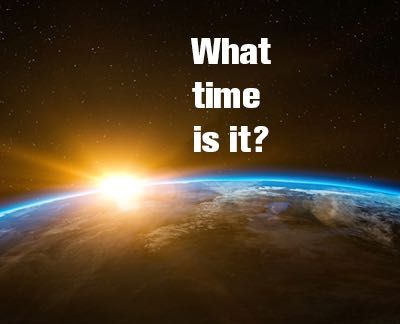 What time is it - press release.
What time is it - press release.
WASHINGTON, D.C. – January 24, 2019 – Citing lack of progress on nuclear risks and climate change dangers as “the new abnormal,” the Doomsday Clock remains at 2 minutes to midnight, as close to the symbolic point of annihilation that the iconic Clock has been since 1953 at the height of the Cold War. The decision announced today to keep the Doomsday Clock at two minutes before midnight was made by the Bulletin of the Atomic Scientists’ Science and Security Board in consultation with the Board of Sponsors, which includes 14 Nobel Laureates.
The full text of the Doomsday Clock statement is available at http://www.thebulletin.org. The statement includes key recommendations about how to #RewindtheDoomsdayClock. Video from the Doomsday Clock announcement at the National Press Club in Washington, D.C., is available at http://clock.thebulletin.org/and on the Bulletin of the Atomic Scientists’Facebook page at https://www.facebook.com/BulletinOfTheAtomicScientists/.
The 2019 Doomsday Clock statement notes: “A new abnormal: It is still two minutes to midnight. Humanity now faces two simultaneous existential threats, either of which would be cause for extreme concern and immediate attention. These major threats—nuclear weapons and climate change—were exacerbated this past year by the increased use of information warfare to undermine democracy around the world, amplifying risk from these and other threats and putting the future of civilization in extraordinary danger… The ‘new abnormal’ that we describe, and that the world now inhabits, is unsustainable and extremely dangerous. The world security situation can be improved, if leaders seek change and citizens demand it. It is 2 minutes to midnight, but there is no reason the Doomsday Clock cannot move away from catastrophe. It has done so in the past, because wise leaders acted—under pressure from informed and engaged citizens around the world.”
In January 2017, the Doomsday Clock’s minute hand edged forward by 30 seconds, to two and a half minutes before midnight. For the first time, the Doomsday Clock was influenced by statements from an incoming US President, Donald Trump, regarding the proliferation and the prospect of actually using nuclear weapons, as well as statements made in opposition to US commitments regarding climate change. Last year, the Doomsday Clock moved forward again to two minutes before midnight.
Rachel Bronson, president and CEO of the Bulletin of the Atomic Scientists, said: “There is nothing normal about the complex and frightening reality we are describing today. The Bulletin of the Atomic Scientists Science and Security Board today sets the Doomsday Clock at two minutes to midnight—the closest it has ever been to apocalypse. Though unchanged from 2018, this setting should be taken not as a sign of stability but as a stark warning to leaders and citizens around the world.”
Former California Governor Jerry Brown, executive chair, Bulletin of the Atomic Scientists, said: “Humanity faces two dire and simultaneous existential threats: nuclear weapons and climate change. The longer world leaders and citizens thoughtlessly inhabit this abnormal reality, the more likely it is that we will experience the unthinkable.”
Former US Secretary of Defense William J. Perry, chair, Bulletin of the Atomic Scientists Board of Sponsors, said: “The current international security situation—what we call the ‘new abnormal’—has extended over two years now. It’s a state as worrisome as the most dangerous times of the Cold War, a state that features a constantly shifting landscape of simmering disputes that keep the world unsettled and multiply the chances that major military conflict will erupt. Brash leaders, intense diplomatic disputes, and regional instabilities combine to create an international context in which nuclear dangers are all too real.”
Herb Lin, senior research scholar for cyber policy and security, Stanford University, Hank J. Holland fellow in Cyber Policy and Security, Hoover Institution at Stanford, and member of the Bulletin of the Atomic Scientists Science and Security Board for cyber/disruptive technologies, said: “Events in 2018 have helped us to better understand an ongoing and intentional corruption of the information environment. Our leaders complain about fake news and invoke alternative facts when reality is inconvenient. They are shamelessly inconsistent. They debase established institutions of government, journalism, and education that hold them accountable. And the Internet and new media enable this corruption to be spread worldwide, attacking the rational discourse required for solving all of the complex problems facing humanity, but especially those of nuclear weapons and climate disruption.”
Robert Rosner, William E. Wrather Distinguished Service professor in the Department of Astronomy and Astrophysics and Physics at the University of Chicago, and chair, Bulletin of the Atomic Scientists Science and Security Board, said: “Threats must be acknowledged before they can be effectively confronted. The current situation—in which intersecting nuclear, climate, and information warfare threats all go insufficiently recognized and addressed, when they are not simply ignored or denied—is unsustainable. The longer world leaders and citizens carelessly inhabit this new and abnormal reality, the more likely the world is to experience catastrophe of historic proportions.”
Sharon Squassoni, research professor of practice, Institute for International Science and Technology Policy, Elliott School of International Affairs, the George Washington University, and member of the Bulletin of the Atomic Scientists Science and Security Board for nuclear risk, said: “The risks associated with nuclear weapons, over the long term, are increasing for three reasons: expensive programs to modernize nuclear arsenals, expansive nuclear doctrines, and a decisive turn away from nuclear arms control. Nuclear restraint, stability, and reductions are desperately needed.”
Susan Solomon, atmospheric chemist, Lee and Geraldine Martin professor of Environmental Studies at Massachusetts Institute of Technology, and member of the Bulletin of the Atomic ScientistsScience and Security Board for climate change, said: “The United States has abandoned its responsibilities to lead the world decarbonization effort. The United States has more resources than poorer nations have; its failure to ambitiously reduce emissions represents an act of gross negligence. The United States stood alone while the other G20 countries signed on to a portion of a joint statement reaffirming their commitment to tackle climate change. Compounding our national lack of leadership on this issue, at a UN climate meeting last month, we undercut an expert assessment of climate change for the UN from the Intergovernmental Panel on Climate Change.”
#RewindtheDoomsdayClock is a major message of the 2019 Doomsday Clock statement, with the following action steps among those recommended:
- US and Russian leaders should return to the negotiating table to resolve differences over the INF treaty; to extend the nuclear arsenal limits of New START beyond 2021 and to seek further reductions in nuclear arms; to discuss a lowering of the alert status of the nuclear arsenals of both countries; to limit nuclear modernization programs that threaten to create a new nuclear arms race; and to start talks aiming toward elimination of battlefield nuclear weapons.
- The United States and Russia should discuss and adopt measures to prevent peacetime military incidents along the borders of NATO. Provocative military exercises and maneuvers hold the potential for crisis escalation. Both militaries must exercise restraint and professionalism, adhering to all norms developed to avoid conflict and accidental encounters.
- US citizens should demand climate action from their government. Climate change is a serious and worsening threat to humanity. Citizens should insist that their governments acknowledge it and act accordingly. President Trump’s decision to withdraw the United States from the Paris climate change agreement was a dire mistake. The Trump administration should revisit that decision, which runs counter to credible science.
- The temperature goal of the Paris climate agreement—to keep warming below 2 degrees Celsius and, ideally, below 1.5 degrees—is consistent with consensus views on climate science, eminently achievable, and economically viable, if poor countries are given the support they need. But countries have to act promptly and redouble their efforts to reduce greenhouse gas emissions well beyond their initial inadequate pledges to the Paris agreement.
- The Trump administration should revisit its lamentable decision to exit the Joint Comprehensive Plan of Action for limiting Iran’s nuclear program. The Iran agreement is not perfect, but it serves the interest of the international community in restraining the spread of nuclear weapons.
- The international community should begin multilateral discussions aimed at establishing norms of behavior, both domestic and international, that discourage and penalize the misuse of information technology to undermine public trust in political institutions, in the media, in science, and in the existence of objective reality itself. Cyber-enabled information warfare is a threat to the common good. Deception campaigns—and leaders intent on blurring the line between fact and politically motivated fantasy—are a profound threat to effective democracies, reducing their ability to address nuclear weapons, climate change, and other existential dangers.
MEDIA CONTACTS: Alex Frank, (703) 276-3264 and [email protected], or Max Karlin, (703) 276-3255 and [email protected]
EDITOR’S NOTE: High-resolution images of the Doomsday Clock are available by contacting Patrick Mitchell, (703) 276-3266 and [email protected]; or Alex Frank, (703) 276-3264 and[email protected]
Together, we make the world safer.
The Bulletin elevates expert voices above the noise. But as an independent nonprofit organization, our operations depend on the support of readers like you. Help us continue to deliver quality journalism that holds leaders accountable. Your support of our work at any level is important. In return, we promise our coverage will be understandable, influential, vigilant, solution-oriented, and fair-minded. Together we can make a difference.
Topics: Doomsday Clock

